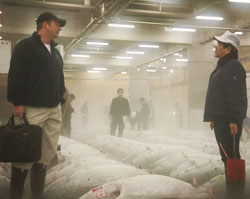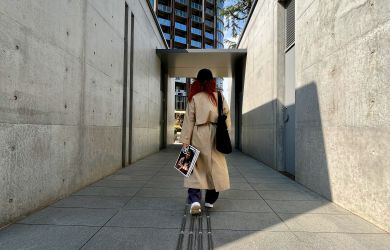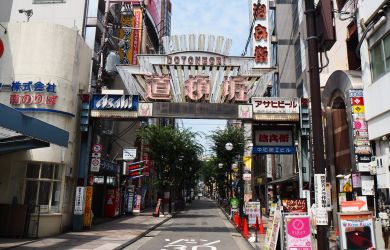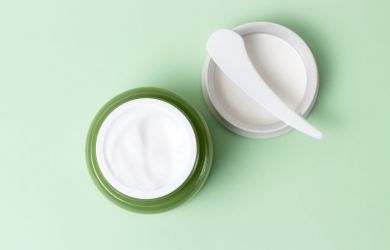
March 6, 2009
Alistair Douglas
An Australian fish seller makes a name for himself in Tsukiji
By Metropolis
Originally published on metropolis.co.jp on March 2009

Photographs by Hideyuki Sudo
Douglas certainly knows what he’s talking about. As one of the first—and only—foreign tuna seller at Tsukiji, he’s witnessed firsthand what happens when upwards of 500 observers make a zoo out of the world’s largest fish market. During the auction, prices can jump up by thousands of dollars on a single bid, and the flash of cameras makes it difficult for the auctioneer to monitor the quick hand signals of the buyers. (The frozen tuna auction has since reopened to tourists, along with a few new guards.)
Douglas first came to Japan in 1993, and soon returned on an undergraduate scholarship to study both Japanese and marine biology. His fascination with the physiology of tuna, the fish as a food source and the politics of stock management set him on a path to receiving his Ph.D. Recognizing that the true experts are the buyers who have spent decades of their lives purchasing tuna, Douglas decided to base his research at Tsukiji. He now finds himself working side-by-side with those same workers, having established his own company in 2007. Seafood Services Japan sells fresh, sustainably sourced Minami Maguro (southern bluefin tuna) at auction floors around the country—and, recently, in London, Hong Kong and the US.
When Douglas starts talking about maguro, his enthusiasm is palpable. “There is nothing boring about tuna,” he says. “They are the most hydrodynamic and athletic fish of the sea, with a body perfectly tweaked for high-energy performance. At up to 700kg and 4 meters in length, and with the need to move at one body length per second just to breathe—if tuna were rugby players, they would be Jonah Lomu.”
Douglas is concerned with efforts to preserve tuna fishing stocks, but he recognizes that this issue has no easy solution. “IUU [illegal, unreported and unregulated] tuna is caught and sold around the world. My challenge is to generate market mechanisms to protect them, as the approach by conservation groups is fraught with misinformation, and regulators are failing with their compliance efforts.”

As an expert on tuna, Douglas offers tips on what to consider when buying the fish at local supermarkets. First, look for the nama kanji (生), which signifies maguro that hasn’t been frozen. Avoid excess drip in the package, an indication that the tuna was previously frozen. Next, keep an eye out for translucency—opaque flesh is a sign of “tuna burn,” meaning the fish was stressed and overheated when caught; this is reflected in the taste. Naturally, look at the color. If you are purchasing akami (the meaty part), it should be cherry red. If you prefer rich tuna, look for marbling, which signifies fat. Finally, start asking where your tuna comes from and whether it is from a sustainable fishery. If retailers come to realize that consumers are looking for sustainably fished tuna, they will start to source it.
Douglas is optimistic about the planned relocation of the Tsukiji market to Toyosu in 2014. Although, like many, he “will be sad to see the Tsukiji chapter end,… the move makes the market more accessible for delivery trucks bringing fish both to and from Narita.” Douglas has hopes that at the new site, provisions will be made for visitors to take in the auction, perhaps on an observation deck. That would make it easier for everyone in Japan, whether they’re a visitor or a long-term resident, to enjoy the king of the ocean. See www.seafoodservices.jp for more info.
Alistair Douglas’ tips on visiting Tsukiji
DO …check out the market’s schedule. It’s closed on Sundays and occasional Wednesdays. See www.tsukiji-market.or.jp for a complete calendar
…follow instructions. Leaflets that state guidelines for observing the tuna auction are available at the market
…come by 5:30am, when the frozen tuna auction starts
…stick to the area that is set for observers.
…use common sense—watch out for vehicles and be conscientious of workers
…choose sensible footwear
DON’T …come drunk. Your health insurance probably won’t cover you if you get hit by a cart—or by an angry wholesaler!
…use a flash
…go into the fresh tuna auction area
EAT Sushi Dai and Daiwa Sushi are Tsukiji’s most renowned restaurants—and they have the lines to prove it. Sushi Zanmai Bekkan offers excellent value for money: 4-10-6 Tsukiji, Chuo-ku. Tel: 03-5148-3737. Open 24 hours. www.kiyomura.co.jp
SHOP For professional-grade sushi knives, try Aritsugu: 4-13-6 Tsukiji, Chuo-ku. Tel: 03-3541-6890. www.aritsugu.jp







